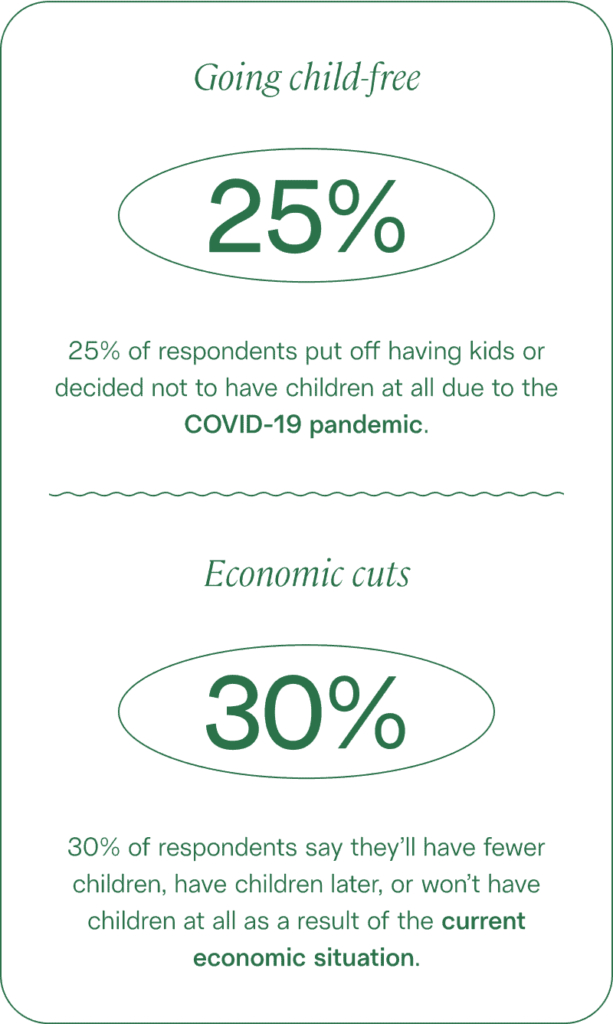When the COVID-19 pandemic hit the US in March 2020, everything seemed to grind to a halt overnight. Now, years after the initial shutdown, it seems we’ve readjusted to a “new normal.”
However, the COVID-19 pandemic continues to have a lasting emotional and financial effect on many. This impact has a far-reaching influence on decision making — including when to start or expand a family. Ongoing uncertainty about the economy has only amplified the financial concerns for many.
We conducted a survey of nearly 3,000 respondents to explore how global uncertainty, health risks such as COVID-19, and economic recession may be affecting family planning and fertility rates.
Findings from the 2023 Sperm Report
- Determining the best time to start or expand a family is often influenced by economic and social factors.
- The health and economic stressors of the pandemic and the following years has led many individuals to delay or completely alter their family-building plans.
- Waiting to start or expand your family can lead to a decline in male and female fertility.
Legacy and Carrot’s survey
Everyone’s feeling the pressure of the pandemic and a looming economic recession — especially parents. At Legacy, we understand that timing can be everything when it comes to fertility and we wanted to learn more about how recent events have influenced many people’s decisions about the best time to start a family.
In November 2022, we sent out a survey asking how the COVID-19 pandemic and economic climate have influenced family-building plans. We received 2,983 responses from respondents between the ages of 18 and 65. Of the group, 50% identified as cisgender men, 48% as cisgender women, and 2% as trans or nonbinary.* These were our findings.
*Note: when we refer to “women” and “men,” we include all people who self-identify as such.
Stressors of the pandemic
During the height of the pandemic, all medical resources were allocated toward patients with COVID-19. Access to fertility care and family planning services was disrupted for months.
By the end of 2020, over 19 million cases of COVID-19 had been reported in the United States alone, and the death toll had risen to over 300,000 people. Everyone across the country has been touched by the pandemic, with many losing family members, friends, and neighbors.
The COVID-19 pandemic left many people struggling with numerous health uncertainties — whether they would catch the virus, what symptoms they could expect, how long it would last, and if there would be any long-term effects.
The concern was especially potent for those considering pregnancy, which puts individuals at a higher risk of severe COVID-19 illness. Pregnancy rates dropped significantly during the early months of pandemic, leading to a decrease in birth rates over the following year.
During the pandemic, parenthood became a lot harder. School shutdowns left many parents on double duty, responsible for childcare and work during the day. For those who had not conceived yet, waiting just made sense. Even now, as schools have returned to normal, teacher shortages and other education challenges have led many to rethink their decision to have (more) children.
Economic stressors
The pandemic contributed to significant job and economic instability. The travel and hospitality industries had major layoffs as international travel shut down and domestic travel slowed. At its peak, the unemployment rate in the United States reached 14.7% in April 2020.
Many people experienced a loss or decrease in income and faced financial hardship. To make matters worse, low-income households were disproportionately impacted by layoffs and economic factors.
For those who had a severe case of COVID-19 or had loved ones who needed hospitalization, the medical costs for treatment and care only added to their financial stress. One study analyzed 4,075 hospitalizations from 2020 and found the mean total out-of-pocket spending for privately insured patients was $788. Meanwhile, the mean out-of-pocket spending on facility services — including hospital accommodation and inpatient laboratory and pharmacy services — for privately insured patients was $3,840.
In the years following, there’s been a worldwide economic downturn, including rising inflation and increasing layoffs. While only time will tell, the majority of economists have predicted that 2023 will bring a global recession.
Deciding to delay parenthood
Health and economic uncertainty remains at the forefront of many people’s minds and, as a result, many are choosing to wait to start a family — or changing their family plans altogether.

In our survey, 25% of respondents reported that they’d put off having kids or decided not to have children at all due to the COVID-19 pandemic.
Meanwhile, 30% of respondents said they’ll have fewer children, have children later, or won’t have children at all as a result of the current economic situation.
Fertility and delayed parenthood
The decision of when to start or expand a family is often influenced by economic and social factors. And given the stress of the COVID-19 pandemic and economic uncertainy, many individuals are left wondering: What’s the harm in waiting until the timing is better?
While everyone should feel empowered to choose the best time for them to have children — after all, parenting is a huge commitment — the decision to wait can impact your chances of conceiving later in life.
While many women are aware that they’re most fertile before they reach their mid-30s, age and fertility isn’t as often discussed when it comes to men. As more and more individuals delay starting their families into their thirties and beyond, it’s worth understanding how age impacts sperm health.
Sperm freezing preserves your highest quality sperm until you’re ready
With parental ages on the rise and record low fertility rates, those who are interested in starting a family at some point in the future should consider what actions they can take, while they’re young, to preserve their fertility.
Most men will continue to produce sperm throughout their entire life. However, there is a measurable decline in sperm quality with age. Sperm quality is important to allow conception to happen and to reduce the child’s risk of inheriting genetic mutations that can result in schizophrenia, bipolar disorder, autism, Down syndrome, or childhood leukemia.
At-home sperm freezing options offer patients increased privacy and comfort while maintaining clinical-level analysis and storage. The freezing process does not significantly impact the quality of sperm, allowing individuals the flexibility to store their sperm indefinitely until they’re ready.



